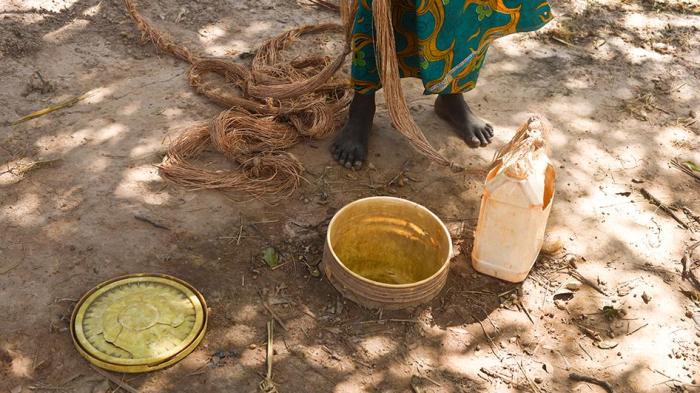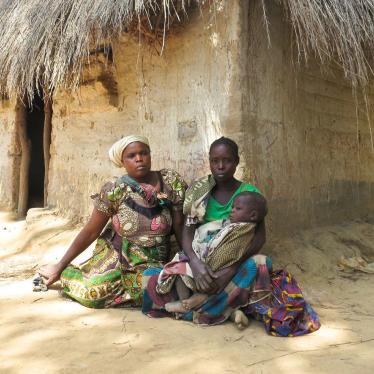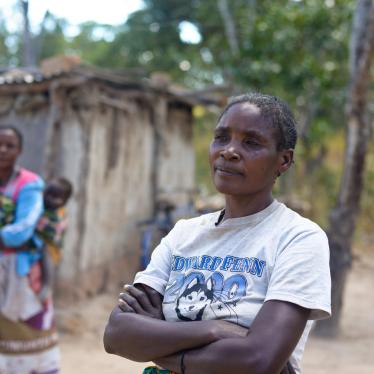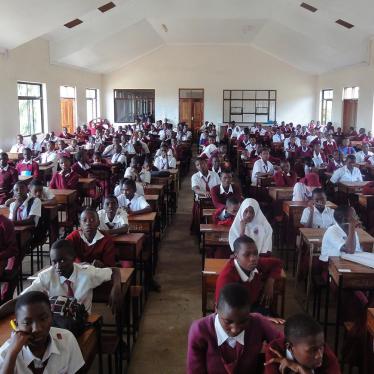A 60-year-old mother of 6 and grandmother to 19, Evelyn K. is a tall dark-skinned woman who speaks quietly but firmly. She carries her despair on her face and looks wistfully as she recounts this life changing moment. After all, she had lived in Milembo, Serenje district, in central Zambia most of her life. She is oblivious to the happy squeals of her grandchildren who are running around her. She sobs quietly, wishes that her husband were alive to help with the family’s problems—since being forced from their land, they are virtually homeless, and no longer have land to grow their food.
In Zambia’s Serenje district, commercial farmers taking over large swaths of land are often failing to compensate families who have been living there for land they’ve lost, and some commercial farmers are even forcibly evicting people from land they’ve lived on for generations. Women like Evelyn K. have disproportionately suffered from the expansion of commercial farming in the district, according to a new Human Rights Watch report, “Forced to Leave.” Responsible for fetching water, they now walk longer distances to bring water to their families, and have little time to tend to their children.
When her husband died of an illness, Evelyn K.’s life became harder but at least she had a home and a small farm. She grew cassava, groundnuts, and potatoes and sold a few to buy soap, cooking oil, salt, and pay for school-related expenses of her children and grandchildren. Her farm hardly ever failed her, and with Milembo stream close by, water for the farm was never a problem.
About a decade ago, a white man called Pierre came and asked them to move out of the land. The government had authorized him and others to take possession of the land. He came with police officers so that they could sit and discuss about moving. “My husband told them about how we had settled on the land, and how they can demarcate so we can live in peace,” she says.
Pierre and Evelyn K.’s community reached a consensus and they all lived together amicably. He farmed on his side and the community farmed on their side, following the agreed boundaries. Many years later, more white people came. Pierre sold the land to Ian, and Ian sold the land to Viljoen. In January 2013, Viljoen called a meeting with the community. He told them that they had to move out within six months. The community explained to him that they had lived with others in peace and could not move because they had nowhere to go. Some had lived there all their lives. They left the meeting believing they had reached an understanding and no one would be evicted.
Then, Viljoen’s employees who lived in the community began telling the families that they should move or else. At this point, a few people moved out.
One morning in June 2013, as Evelyn K. sat with her children and grandchildren in her kitchen, she heard noises. Two bulldozers were approaching her home. The drivers of the bulldozers told them that today you will move. Evelyn K. and her children scrambled to grab what they could out of the house before the bulldozer broke through the bricks. Viljoen’s workers drove the bulldozers over her cultivated fields, destroying her cassava and sweet potatoes. By noon, she had nothing.
A tractor came by and the driver told everyone whose home was demolished to get on. Evelyn K., her children and grandchildren got on the tractor along with their neighbors. They were driven off of the farm and told to get off by the road near a forest. The tractor drove off, leaving several families confused and desperate, with nowhere to go.
“We slept under the stars that night,” says Evelyn K. They tried to make some makeshift structures using young bendy branches and some leaves. But nothing prepared them for the biting June cold.
The next morning, they went to the Boma (District Commissioner) and reported their plight. He was sympathetic, “He said Zambians should not be treated this way,” Evelyn K. says.
Sometime later, the Disaster Mitigation and Management Unit, an agency of the office of the vice president, came and gave each family at least one tent. Some bigger families had 2 tents. They also gave maize meal, 50 kg, or more depending on the size of the family. They were given maize meal in the first year, then again in 2014, but have not received any help from the government since.
“The children were deflated, my oldest was furious. She thought about all they had before, a brick house! And now they lived by the road in a mud shelter,” says Evelyn K. “My husband died there [Milembo]. My husband and children’s graves were destroyed too, I ask myself how I can live with this.”
Life in the forest reserve is difficult. Evelyn K. and the rest of the evicted families are not allowed to farm there. They do not feel safe. “One time I was unwell and I left the hut and went to sleep by the river so I could have fresh water. My child who would stay home traveled to Ndola and thieves came and stole my two tents. Now I have nothing,” says Evelyn K. amidst sobs.
There is no school nearby. One community school was demolished to make way for commercial farming, while the public school is too far away for the young grandchildren to attend. “Does this mean my grandchildren will grow up like me not being able to talk with others in English? Having to rely on translators?” wonders Evelyn K. She worries about her grandchildren, and what will their future be.
She wants the government to give her land that she can call her own, where she is sure no one will evict her family.





